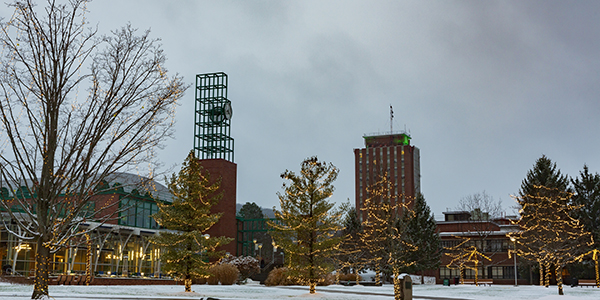Binghamton University scholarships enable students to graduate on time
Over 300 students receive scholarships for winter session

Imagine you’re just a few courses away from earning your college degree. Then imagine the feeling when you realize you don’t know how you’ll afford to graduate on time.
That was the scenario facing one student, who asked not to be identified by name. “I was planning on taking a winter course because I needed it to graduate on time, but I wasn’t exactly sure how I was going to make that happen,” he said. The senior integrative neuroscience major works two jobs to help pay for his Binghamton education and even tried looking for a third job to ensure he could graduate in May.
“I was looking at paychecks and paystubs and thinking how I could squirrel away 50 bucks here, 50 bucks there to pay for it.”
Unfortunately, there are many others like him.
“Financial challenges are one of the principal reasons that economically disadvantaged students don’t graduate,” said Binghamton University Executive Vice President for Academic Affairs and Provost Donald Nieman. “That’s a shame because it means that they can’t fully benefit from the investment they have made in their education and many good career opportunities are closed to them. Keeping students on track to graduate in four years lessens the cost, reduces the financial challenges, and makes graduation and career success more likely,” he said.
This year presented University leaders with a unique opportunity to assist determined students to make progress toward their degrees. Typically, the winter session is more compressed than the summer session, but this year, the extended break due to COVID-19 made it comparable.
“An extended winter break means students can take up to eight credits instead of the typical four, and we can also offer more courses,” said Donald Loewen, vice provost for undergraduate education and enrollment management.
The Provost’s Office has taken advantage of this opportunity by funding scholarships for high-need students (those eligible for Federal Pell grants) to take a course during the winter session. Recipients pay the first $150 for the course and the scholarship covers the remainder of tuition and fees (up to $1200 for a four-credit course). Three hundred and fifteen students were awarded scholarships.
“It is a genuine hardship that some students would have without this,” said Loewen. “You can’t get federal aid for winter session, so unfortunately, a lot of students use their financial aid award from the spring semester toward their winter courses to cover costs and that makes them short in the spring. It’s a significant challenge to fund a winter course, so this is a huge win for them.”
Loewen added that this could save a student 10-to-15 thousand dollars if they’re a course short of a degree requirement and this enables them to graduate in May 2021.
“Not to dramatize it too much, but this scholarship is making it possible to sleep at night,” the student said. “I was going to figure it out regardless, but a huge weight was lifted off my shoulders. It was certainly nice to have someone walk in and say we appreciate the work you’re doing and we want to lift some of that financial burden for you.”
The Binghamton Fund learned about the initiative and contributed an additional $10,000. John Koch, vice president for advancement, said assisting students at this time is more critical than ever.
“Since COVID-19, the needs of our students have changed in ways we couldn’t have predicted a year ago. Binghamton Fund donors made it possible for us to pivot quickly in the spring (by providing COVID-19 student emergency grants, personal Wi-Fi hotspots to students otherwise unable to connect for distance learning and emergency-relief scholarships) and now, by giving students the resources they need to complete their coursework during the extended winter session,” Koch said.
With his final coursework requirements on schedule, this student is turning his attention to his post-graduation goal of becoming a physician assistant (PA). Next year he’ll work as an emergency room technician to fulfill the patient-contact hours required to apply to PA school. But first, he can’t wait to walk across that stage (even if it’s only metaphorically!).
“I’m so stoked to graduate,” he said. “I’ve long envisioned walking across the stage or over Zoom (however it shakes out!). I’ll take a class over winter, the final few in the spring and I’ve done it!”
